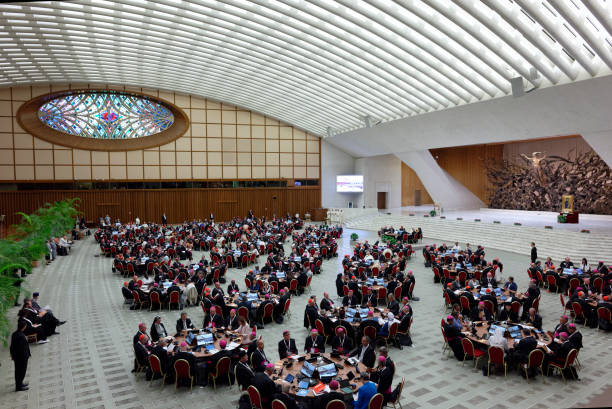
The Catholic Weekly in its opinion page has an article by a director of a research institute who wants the word laity changed from "ordinary, common, believer" which is the literal meaning of (평신도) in Korean to something else.
She remembers an article published in a Catholic newspaper last summer about the title 'Pope' in Korea which has the meaning of king of the church. She mentions a priest that presented the opinion that leader of the church (교종) would be more appropriate in the spirit of the Synod. He also suggested that the word for the laity in Korean was also problematic. The priest explained that the term laity distinguishes the holy from the ordinary which goes to show how hierarchical the Catholic Church is and how trapped we are in a vertical structure. He wants to use the word 'Saints' for the laity as in the early church.
About 40 years ago, a Korean lay theologian Yang Han-mo wrote in his book "Thoughts on Believer" (Catholic Publishing, 1982), which dealt with the theology on the word 'believer' in accordance with the spirit of the Second Vatican Council. There is discrimination inherent in the word 'pyeong' (平)’ ordinary believer therefore:"I don’t think we are exaggerating within God’s people, that is, the church to say this", and used the word 'believer' instead of the Korean word for 'laity'.
Teacher Yang points out that in church history, the distinction between clergy and believers began after the 3rd century, and that positions according to different gifts should not be treated as ranks and separation. At the same time, we recall that in the New Testament, members of the Christian community are referred to as 'holy ones', 'disciples', and 'brothers'.
Like this, there have been issues raised about the title 'layperson' from early on, but since the words 'saint' and 'believer' are used a lot in Protestant churches, the Catholic Church continues to use the word 'layperson'. However, when she had the opportunity to greet Protestants and Buddhist believers and introduced herself as a 'Catholic layperson', she received a curious response. They asked her why she used the word 'lay' believer and whether there were separate 'high-ranking' believers. She once again realized that to those who are not Catholics, the title 'layperson' sounds like a derogatory and discriminatory term.
The problem with the title 'laity' stems from the fact that there are elements of the term that are not appropriate for believers to properly recognize their identity and perform their roles well. Just as the leader of the church is concerned about the title 'Pope' in that it should not be mistaken for 'Emperor', the term 'layperson' carries the meaning that Christians living in the world are unholy 'secular people' or 'non-experts' regarding faith.
The first session of the 16th Ordinary General Assembly of the World Synod of Bishops recently ended. This synod stated that the church's way of life and activity should be a 'way to walk together' (synodalitas), and that all members of the church should share 'communion' and 'participate' in order to carry out the 'mission' of spreading the gospel to the world. They discussed together how to do it. The topic of the synod was about ways for church members to cooperate together, but the discussion also started with listening to the voices of believers in each local church, and the composition of the general assembly delegates also included not only bishops but also believers, laity, religious, priests although it was a synod composed of bishops in the past. She is not sure yet whether the participation of believers as delegates is a special exception only for this synod that deals with the spirit of the synod or a structural change that will continue in the future, but if believers, the majority of God's people, do not join, the church that proclaims the gospel of the kingdom of God to the world It will be difficult for the community's mission to be properly realized
The Second Vatican Council stated that believers should be the 'soul of the world', witnesses to the resurrection and life of Jesus and a sign of the living God in the world (Article 38 of the Constitution of the Church). Today in Korea is Laity Sunday, which remembers the calling of believers sent out to the world, she would like to suggest a variety of appropriate terms that clearly reveal our sense of identity.